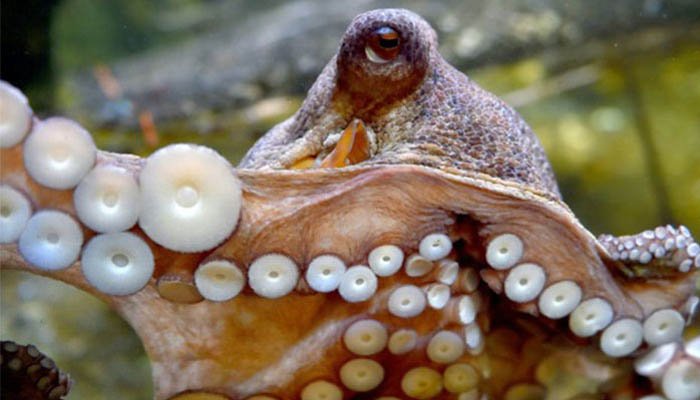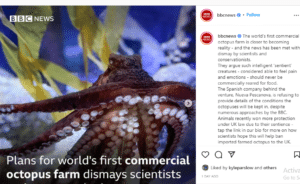World’s first octopus farm on cards

The world’s first commercial octopus farm is closer to becoming a reality but scientists and conservationists have discouraged the idea. They argue such intelligent “sentient” creatures can feel pain and emotions and should never be commercially produced for food.
Stacey Tonkin, who is one of a team of five aquarists at Bristol Aquarium, plays with a giant pacific Octopus named DJ — short for Davy Jones — which is part of her job. She has reported to BBC about how much an octopus can feel and have emotions, they even have mood swings and change colours according to it.
Briefing about the animal’s nature, she said: “He exhibits what you’d expect a teenager to be like – some days he’s grumpy and sleeps all day. Then other days he’s playful and active and wants to charge around his tank and show off.”

According to Tonkin, the octopus shows his intelligence through his eyes. “When you look at him, and he looks at you, you can sense there’s something.”
Things have revolutionised since a team of experts sifted through more than 300 scientific studies and concluded that octopuses were “sentient beings” and there was “strong scientific evidence” that they could experience pleasure, excitement and joy, but also pain, distress and harm.
Around the world octopus tentacles sizzle in pans, coil on plates and float in soups, from Asia to the Mediterranean and increasingly the USA, as reported by BBC.
These creatures are eaten alive in South Korea. According to the report, the prices of octopuses are increasing in the market as the ratio of them in the wild is decreasing. Each year around 350,000 tons are caught which is more than 10 times the number caught in 1950.
The authors said they were “convinced that high-welfare octopus farming was impossible and the government could consider a ban on imported farmed octopus in future.”
According to BBC, the Spanish multinational, Nueva Pescanova (NP) has announced that it will start marketing farmed octopus next summer, to sell it in 2023. It was reported that 3,000 tons of octopus will be produced every year.
The company said that “it will help to stop so many octopuses being taken from the wild.”
NP has refused to reveal any details of what conditions the octopuses will be kept in, despite numerous approaches. The size of the tanks, the food they will eat and how they will be killed are all kept as a secret.
Despite numerous approaches by the BBC — Nueva Pescanova has refused to unfold any details of what conditions the octopuses will be kept in.
An international group of researchers as “ethically and ecologically unjustified” has denounced the plans. The campaign group Compassion in World Farming (CIWF) has written to the governments of several countries — including Spain — urging them to ban it, as reported by BBC.





